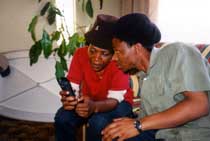Meeting a slave and an adict What makes my plan so difficult is the fact that most blacks and coloureds don’t think about time in the same way as I do. This means that when I ask them questions that deal with the past or the present, they have a completely diffe-rent perception of time. Most of the time their age is very unclear. Time is related to events. Things like Mandela gets free in ’90, elections in ’94, ’87 big fights in Alex, et cetera.
So all the questions cause confusion for them as well as for me. So, I have to do this in a different way. So many bad things have happened that questions concerning fear are being avoided. Whites on the contrary are very specific in their answers. This has happened, this hasn?t, et cetera. I must develop different tactics.
I start to understand more and more what the film should be like. I think, the same as applies to most of the other things I do, that my sources of inspiration are the place, or the moment, the energy somewhere or the people. Here it is the people. The People in South Africa: their future, et cetera. But it’s about much more universal feelings and images. All the events could also take place in North America. It is only necessary for me as a maker to do it here. Here, where everything is so extreme. Where nature and cities are a large, visual extreme paradise. Where power and force are constantly very clear at the surface.
Many of the things I write down in my report will find a place in the film, but the why and the how will originate from my imagination. I want to make it even more extreme. More absurd. I don’t think I want to hear many words in the film. In the meantime the day has gone by. What a day it was. What extre-me situations.
A small photocopier’s annex printer’s. I talk to the black guy who belongs to the shop and is being sold together with it again and again. He just belongs to one of the machines. He really has such a bourgeois mentality. He wants his children to become doctor and nurse (son and daughter). He doesn’t want to loose his job, and he wants to have a car.
Then we go to a transhipment company in catering articles. The director of the company, a progressive type, allows me to talk to everyone. I talk to 4 employees, 3 black guys and an Indian woman. One of the boys is great. The new South Africa. Dynamic, brimming with ambition. But he is so western. Far away from his parents. I don’t know if I like it, or not. That terrible American system spreads unchecked. He will cope. The others are not so special. They have the usual problems. One has a son who drinks himself to death. The other one cannot raise her daughter. And dumped her with an aunt.
During all these conversations I realise that this are not the people I must talk to. They don’t stimulate my imagination. They?re not extreme enough. I’ve heard all this before.
After that I talk to the other director. Very scared and very rich. We were not allowed to tape it, so we did it secretly.
And then again to a completely opposite situation. A squatted house where only artists live. Sort of a Tetterode (famous squat in Amster-dam) in the first year. But than in ’78. In feel flashbacks everywhere and in everything. The struggle between people about whom can stay and who cannot. Who is too much of a junky and who isn’t. But they are all very drugged. I meet Vuil (is a boy) after 4 years. He?s a great artist, but he’s on hard drugs. He lives in the cellar in a kind of safe with a 5-year-old child and a girlfriend (totally bummed). But he makes really beautiful things. I don’t tell him why I am here. I only lis-ten. And I hear beautiful stories. Full of pain. Full of frustration. Pain about being white. Pain about parents who don’t understand them. But besides this there is also so many energy for their art. I hope they will manage. It is really beautiful here. And together they are very strong, despite everything that they don’t have. They want to start an art centre. The rooms are beautiful.
I think that in ten years time, if drugs haven’t destroyed them by then, they will become very ambiti-ous people who will own centres like Oibibio (New Age Centre in Amsterdam). No, more art orientated centres. They only think about the usual ideals like ‘save the planet’.
Tomorrow morning we will fly to George at 6 o’clock. We will be picked up there.
Cathy rings round half of South Africa for appointments. She now has a mobile phone, which doesn?t completely work yet, but I suppose it will tomorrow.

Problems with the mobile phone